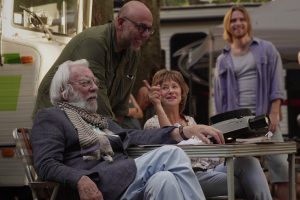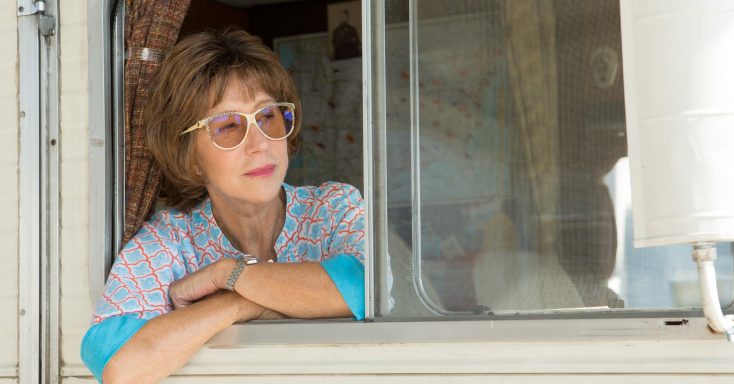
(l-r) Donald Sutherland, director Paolo Virzi and Helen Mirren on the set of THE LEISURE SEEKER. ©Sony Pictures Classics.
By ANGELA DAWSON
Front Row Features
HOLLYWOOD—Before she gamely was a jet ski model on the 90th Academy Awards presentation, Helen Mirren was an Academy Award winner with a lengthy and impressive body of work.
The British actress, who won an Oscar for her dead-on performance as Queen Elizabeth II in Stephen Frears’ “The Queen,” co-stars opposite fellow Oscar winner Donald Sutherland (2017 lifetime achievement) as a pair of aging adventurers in Italian filmmaker Paolo Virzi’s “The Leisure Seeker.” The title refers to the nickname of the recreational vehicle.
Mirren, who has been married to American filmmaker Taylor Hackford since 1997, spoke about playing a senior who must care for her husband, a former English teacher, whose memory is slipping away due to dementia. The New England couple decide to take one last road trip in their aging RV to the Florida Keys, against their adult children’s wishes. Over the course of their spontaneous odyssey, the long-time married couple discover truths about each other and about themselves that they hadn’t addressed previously as they were busy with careers and raising a family. Now, in their twilight years, the couple have to do determine if they can make it to the end of the road together.
Q: What is the joy and the fear in aging?
Mirren: The joy is the wisdom, if that’s the right word—it’s not really the right word—that comes with getting older. Let’s say the understandings that come with it and the letting go of things that seem to be so terribly important when you’re 16 or 22. Then as you get older, you let go of a lot of things. I would say that’s the joy, definitely. The fear obviously is the fear of becoming incapacitated. The fear of what happens to Donald’s character.
It’s also a challenge, a challenge of courage. The knowledge is that from the moment you’re born, to get old is in your destiny. It’s in your destiny. There are certain cultures that understand this much better than we do. I would say the Japanese culture probably does.
Q: Have you ever taken a road trip?
Mirren: Yes, I have. I took a road trip with my husband quite a few years ago. We went across the south, from Natchez (Mississippi) to Charleston (S.C.). It was a wonderful trip, really wonderful. We didn’t actually sleep in the van. We stayed in little bed and breakfast places. But we drove, and it was a great trip. Also, early in my career when I came to do theater, it was sort of a road trip. We were playing in San Francisco and our next date was in Detroit and we had four days in between. I decided to take a train from San Francisco to Detroit and that was an amazing journey. That was a fantastic journey, to understand what those Western pioneers walked across. It was mind-blowing. It gave me a view into the American character that I would never have had, otherwise.
Q: Was the sex scene with Donald Sutherland toward the end of the film awkward to shoot?
Mirren: I have to say I was absolutely dreading doing that scene. I really didn’t want to do it. I was mortified. But I had the huge advantage of (co-starring with) Donald Sutherland. First of all, the scene was written in a different way. It was much more sort of bang, bang, bang sort of sex.
Q: Was it more brutal?
Mirren: Yeah, more brutal. Donald said, “No, that is wrong. It’s the wrong turn. It’s the wrong thing.” Because of his voice obviously in the film was very powerful so that very gentle, loving moment of connection between two people looking into each other’s eyes, being in each other’s bodies, and that heightened moment of love, which was such a better idea, I felt.
Q: Paolo has said that you brought a lot of your personal relationship with your husband to your character. What were some of the personal touches that you brought in?
Mirren: I can’t really remember. It’s interesting when you have to make a relationship that has to be profound and believable with an actor that you don’t really know. I didn’t know Donald. I’d worked with him 20-odd years ago (in 1990’s “Bethune: The Making of a Hero”), but even in that movie we didn’t have a lot of scenes together. He was a big star. It was like, “Oh, it’s Donald Sutherland!”
On this, we turned up on set the week before you start rehearsal, and in one week you have to try and make a relationship between you that looks as if it’s lasted for 50 years. You have to somehow create the intimacy and the ease. As actors, you have ways of doing that. We have a facility in us to create that. I think we helped each other in that. I was very lucky that it was Donald that I was dealing with, because Donald is extremely sensitive and emotional and he’s not a closed off person. He’s not like this. If he’s upset you know it, if he’s happy you know it. He’s wonderfully exposed, for want of a better word. It became so much easier then to make this relationship that the audience have to believe is real on the screen.
Q: Did you learn anything about yourself playing Ella?
Mirren: I did a lot of dialect work. That was about it, really, in terms of preparation. Some roles you really have to deeply prepare for. Others, it’s sometimes better just to work instinctively. With Ella, I chose to work instinctively and just what is on the page. I think the most important thing that I had to do in this film was to make that relationship with Donald believable. That was nothing to do with research or prep. I couldn’t do that without his physical presence, without making a relationship with him. So, I did very, very little prep but I put a huge amount of energy and commitment and emotional contact into trying to make that relationship believable.
Q: Your character Ella is so interesting because she is not just the perfect wife that is so understanding. She has jealousy, she’s fed up with having to deal with this man forgetting stuff and she’s hurt by it. What was it that made you find the core of Ella, having this multi-layered character and feelings about her husband all mixed up?
Mirren: Honestly, it was the script. It was the story of the script. whether that sensibility came from Stephen, I’m sure it came from a combination of Paolo and Stephen (Amidon, the co-writer), because Paolo’s vision, look at life is always three dimensional. It’s never simplistic. It’s finding comedy in tragedy. It’s finding nobility in ignominy, it’s finding hatred and love can actually survive together. That’s the nature of Paolo’s work, which was really my number one reason for wanting to do the film, was watching Paolo’s work. I have to say if you see those elements in the character, honestly it comes from the vision of Paolo and Stephen our writer, I would say. Then me, just trying to do it as best I could, really.
Q: Have you ever given thought to directing a film?
Mirren: I did direct a film. It was a half hour film (the “Happy Birthday” segment of 2001’s “On the Edge”) for Showtime. I loved it. I absolutely loved the process. I say, to my credit, I was actually very good at it. Showtime certainly wanted me then to do a full-length feature for them, but I realized as much as I loved it and it was very, very good for me as an actress. As a director, I would be a visitor, really—a tourist in the world of directing. If I was a true director, I would have become a director by the time I directed. So, as much as I loved it, and it was very, very valuable, I thought, “That’s great, I’ve done that. Now I know so much more about the process. I’ll just go on with my life as an actress.”





